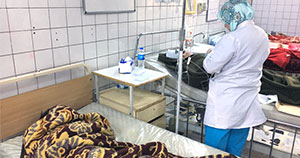 9 November 2016 – The stories of civilians caught in the cross-fire in and around Mosul are heartbreaking and horrific. WHO is ensuring that life-saving health services are available to injured people, supporting the tireless work of the Erbil Directorate of Health to provide emergency medical care to all those who need it.
9 November 2016 – The stories of civilians caught in the cross-fire in and around Mosul are heartbreaking and horrific. WHO is ensuring that life-saving health services are available to injured people, supporting the tireless work of the Erbil Directorate of Health to provide emergency medical care to all those who need it.
14-year old Ahmed* and his mother were at home in Hammam Ali, a small town south of Mosul, when their building was hit by an airstrike. The town had just been liberated, and opposition forces were leaving a trail of destruction behind as they retreated. Minutes after the blast, Ahmed and his mother were pulled out of the rubble by passers-by, and taken by military forces to nearby Qayyarah, going through several security checkpoints that made the usually short trip last almost an hour.
Because the main hospital in Qayyarah remains damaged, Ahmed and his mother were taken to the town’s main primary health care centre, where they were joined by Ahmed’s aunt. They were placed in an ambulance and driven to the closest referral hospital in Erbil – almost one and a half hours away. By the time Ahmed and his mother arrived to the Emergency Hospital, it had been almost 4 hours since they had been recovered from the rubble.
Ahmed and his mother were immediately taken to the hospital’s emergency unit. Ahmed had sustained multiple shell wounds to his legs. His mother’s injuries were more extensive, with multiple wounds covering most of her body. Since arriving to the hospital on November 6, Ahmed has been extremely traumatized. He refuses to talk, and constantly shouts out for his mother. Doctors say he also requires urgent psychological care.
Since 17 October, the Emergency Hospital in Erbil has received an average of 15 injured patients a day. On some days, 20 to 30 injured patients are brought into the emergency unit. The majority of them are suffering from gunshot wounds, while others have shell injuries and mine injuries. On the day Ahmed and his mother were admitted, the hospital had already received a 2-year-old boy with a gunshot wound in the chest, a 3-year-old and her 2 sisters. all suffering from shell injuries, and an 8-year-old girl whose legs were severely injured as a result of shell injuries and who had also sustained injuries to her kidney and spleen.
As of 8 November, all 25 beds in the hospital’s emergency room are occupied, and new cases are now re-diverted to one of 2 other emergency hospitals in Erbil. The hospital’s capacity is overstretched, and additional health staff and medical supplies are urgently needed. As the conflict continues, WHO estimates a total of 40 000 people will require urgent hospitalization for injuries. WHO is working with national health authorities and partners to identify referral pathways for injured patients, and restore main hospitals closer to the front lines.
In anticipation of increasing numbers of patients arriving to Erbil, on 8 November WHO delivered medicines and supplies to the Emergency Hospital sufficient for 300 patients requiring surgical care. Additional medicines and supplies sufficient for 70 000 beneficiaries have been delivered to the Erbil directorate of health for distribution to health facilities across the governorate. To strengthen referral services, WHO has provided 2 ambulances, and is working with the directorate to arrange incentives for health staff.
This support by WHO has been made possible by funding from the European Union (ECHO), the Office of U.S. Foreign Disaster Assistance (OFDA) and the Iraq Humanitarian Pooled Fund.
Related links
European Commission's Humanitarian Aid and Civil Protection
United States Agency for International Development's Office of U.S. Foreign Disaster Assistance


